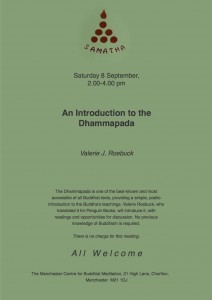The mind is hard to restrain, light,
Flying where it will.
Control of it is good.
Mind controlled brings happiness.
Dhammapada 35
We live in an age where, more and more, we expect instant results. We lead busy lives and want faster broadband, quick service and next day delivery. It is hard to believe that ‘self-control’ or ‘control of the mind’ can really bring happiness. Spontaneity is all, regardless of whether the thing we want to do is objectively good for us or not. But if we look around us, it is not hard to see the suffering that can be caused when people surrender to all their impulses.
There is a tendency now to see ourselves as passive creatures, helpless in the face of urges such as desire or anger. How often do we hear (or find ourselves saying) things like: ‘He made me so angry, I said something I regretted’? But the anger is not ‘out there’, it has arisen in ourselves. Perhaps the other person did do something wrong, but we chose to act upon our anger. Reacting in a different way – from calmness and strength – might have resolved the situation in a better way, leaving less regret behind. The problem is that impulses like anger, greed, fear, hatred etc arise so quickly that they can take control of our minds before we even see them coming.
Meditation is a useful tool here because it brings insight into what is happening, almost seeming to slow the process down, so we can catch the impulses as (or even before) they arise. The insight allows us to take a degree of control over the impulses, rather than be swept away by them.
Meditation also helps us to develop more wholesome mental states, such as calmness, kindness, and wisdom. These states are natural to us, but they become overridden by habit and conditioning. Once we are able to turn away from distractions, we will find a peace and strength that we may have lost sight of over the years. Then when, as is bound to happen in this world, we are faced with difficult situations or people, we will begin to respond with wisdom and compassion rather than anger, envy, or fear.
As the verse tells us, finding this kind of control is not always easy, and it may go against decades of habit, and the values of society around us. But if we can find it, it will bring genuine happiness, regardless of our circumstances, deeper and more lasting than can be afforded by any technology or fashion.
(An article originally written for the Newsletter of the Manchester Centre for Buddhist Meditation)

